The Nourishing Homestead, by Ben Hewitt: fun comes in threes!
Oh, do I have something fun to share with you today, Gentle Readers! Three fun things, actually. I’ve had the privilege of reading Ben Hewitt’s new book that he wrote with his wife, Penny: The Nourishing Homestead, One back-to-the-land Family’s Plan for Cultivating Soil, Skills, and Spirit.
I’m going to share a bit about this book (Fun Thing One). And then I’m going to share Ben Himself . . . well, not in the flesh, but I had a fun telephone interview with Ben earlier this week, and so that’s Fun Thing Two and because fun things are always best in threes . . . I’m going to give you an opportunity to enter a giveaway for your own copy of this book, from Chelsea Green Publishing. See? Fun! 🙂
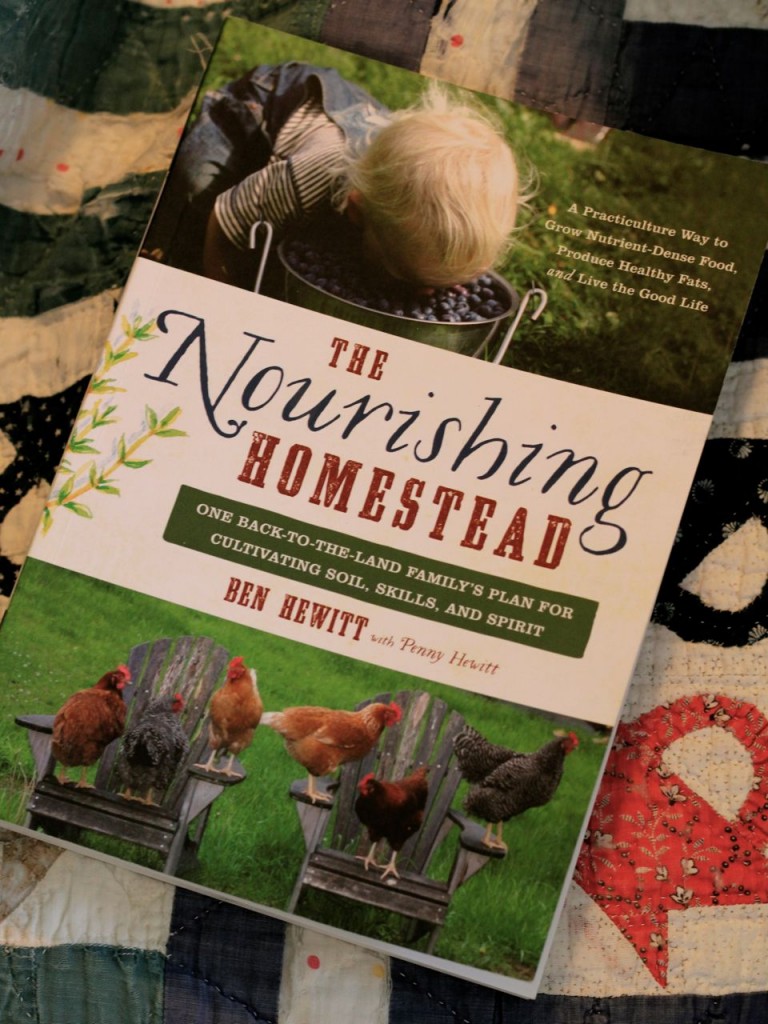
Ben is the author of one of my favorite blogs, as well as numerous books, including the beautiful book on their family’s homeschooling journey, Home Grown: Adventures in Parenting off the Beaten Path, Unschooling, and Reconnecting with the Natural World.
Ben and his wife, Penny, have built a productive homestead with their two sons Finlay and Rye, on a rolling 40-acre plot in Vermont, where they raise animals and chickens and make their own bacon and kimchi and baskets and whatnot. Ben uses the word “whatnot” a lot.
They also hold occasional workshops teaching largely-forgotten skills such as beaver hide-tanning and wooden spoon-making. Yep. Lots of folks want to be them, or at least to do what they do–in part or in the whole. Ben puzzles about this, in his writing, but if you read his blog for a time, and if you take in the gorgeous photos that Penny takes and that Ben shares on his blog and in his new book, you’ll get why. What a beautiful life.
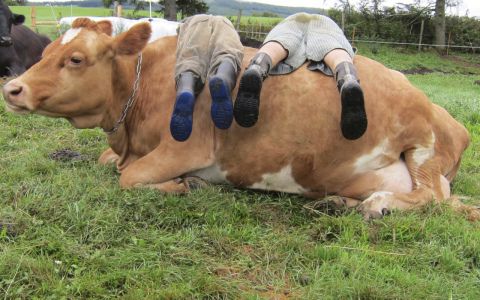
If you feel a pull to learn more about homesteading and this sort of life--a life in which you are not so dependent on corporate food and services–if you want to do a little or a lot to provide for your own self and your own family, this new book will not only show you how to do it, but also why it can be so satisfying. Ben and Penny have included scads of hands-on tutorials and advice in areas of homesteading infrastructure, raising animals, raising your own food, and making your soil as productive as it can be. I find Ben and Penny’s backstory, how they started this journey nearly 20 years ago, just as fascinating as all the practical how-to stuff that I love to read about. And (to please the foodies) there are a few recipes, too!
For me, The Nourishing Homestead definitely has a permanent place in my Homesteading library: right next to Eliot Coleman’s excellent gardening books, and The Encyclopedia of Country Living, and many others that I refer to again and again.
I waited until we got socked with an awesome snowstorm here in Nebraska, so I could pretend that I was sitting across the table with Ben, in Vermont, drinking a hot bevvie, before I called him. And I discovered that Ben likes a good cup of coffee, so I have a cup of coffee in hand. I’ve poured one for Ben, too. I guess I’ll be drinking both. (By the way, all photo credits go to Penny Hewitt.)
Let’s talk, Ben.
Hey, Ben! How’s the weather in Vermont today?
Ben: Very cold and very snowy! We haven’t had a January thaw at all yet, and very few mornings above zero, so we’re all getting a little tired of being cold. . . but lamenting the weather is something I try not to do . . . (laughs) . . . it’s not like we have a choice in the matter! Plus, the cross-country skiing is ridiculously good right now. And no matter how hard winter can be at times, I really need changing seasons to thrive. Each season sort of develops my appreciation for the others, if that makes any sense. Right now, I’m gaining some serious appreciation for spring!
Me: Practical matters first. I made kimchi, but my family is not impressed by eating it out of the jar, as I am. I just recently wrote a blog post about it, in fact. How do you and your family eat it?
We don’t buy in any vegetables in winter, so right about now, we really start looking forward to fresh greens. We make a pretty mild kimchi, because Penny doesn’t have much tolerance for spicy food. That’s the only thing I’d change about her if I could. Oh, and she doesn’t drink coffee and I’d like someone to drink coffee with. So that’s two things, I guess. But I can live with them!
Me: You mentioned in The Nourishing Homestead that you are content where you are, and that you have no desire to travel. “But,” you said, “there are times we do want to travel. Absolutely. Someday, we will.” My question: If you could go anywhere with your boys on a trip, where would you go?
Ben: We do talk about going somewhere to experience another culture. South America has come up a few times. And we have talked about an extended road trip in North America, visiting friends and camping. But there’s no question that our sense of contentment is very real. We don’t spend much time imagining what else we could be doing because we’re pretty darn happy with how things are. And there’s certainly an affordability aspect to it. We’ve chosen a particular way of life, and that way of life happens to not include much disposable income.
It’s true that Penny has a bit more wanderlust than I do. When we met, she had just gotten home from Australia and New Zealand, where she had been hitchhiking around and working on farms. She was actually planning to return to New Zealand and marry a Kiwi so she could settle there, but I sort of derailed those plans.
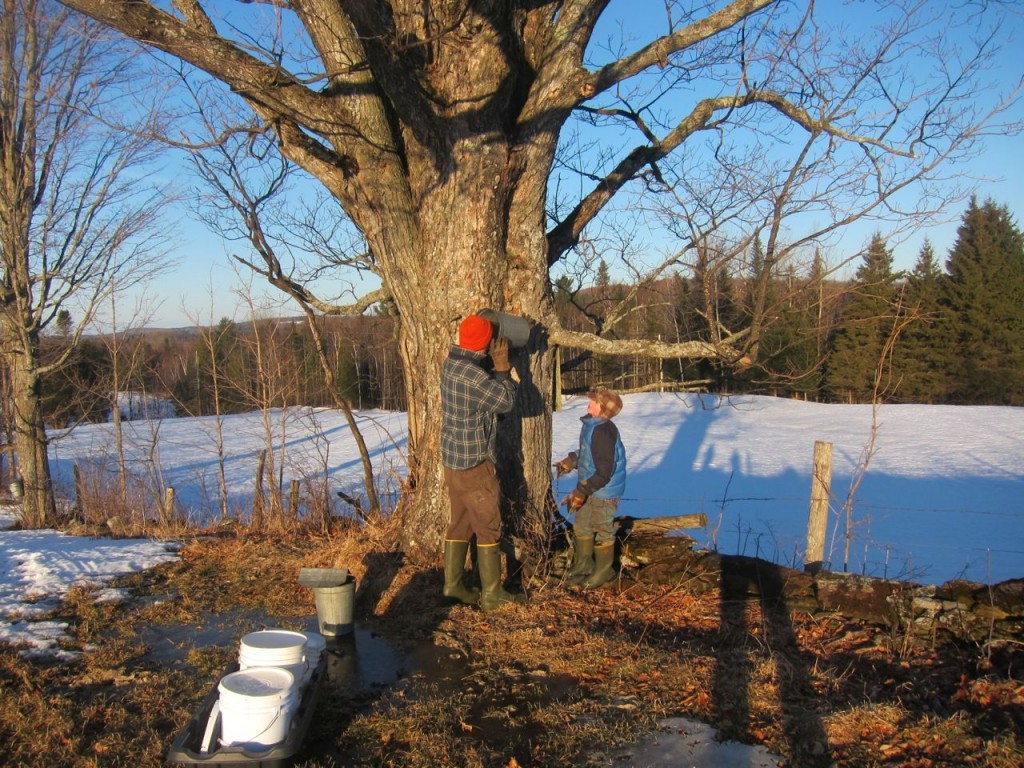
Me: What books are you reading right now?
Ben: I almost hate to admit this, but I don’t read a ton of books. I subscribe to Harper’s and my dad recently bought me a subscription to The New Yorker, and since my background is magazine writing, I enjoy reading that genre, but I don’t read a ton of books. The boys read way more than Penny and I do at this point, partly because we just don’t stay up late enough to read most nights. And lately I’ve been choosing to play guitar and play cards with the boys in the evenings.
But I could give you a few book recommendations: I just finished My Ishmael by Daniel Quinn
and was totally captivated by that book. Also Ishmael: An Adventure of the Mind and Spirit, by the same author. Also a sweet coming of age book that I finished recently was The Earth Is Enough: Growing Up in a World of Flyfishing, Trout & Old Men (The Pruett Series)
. I love that book. I also really liked Elliot Merrick’s True North: A Journey into Unexplored Wilderness
. That’s an awesome book.
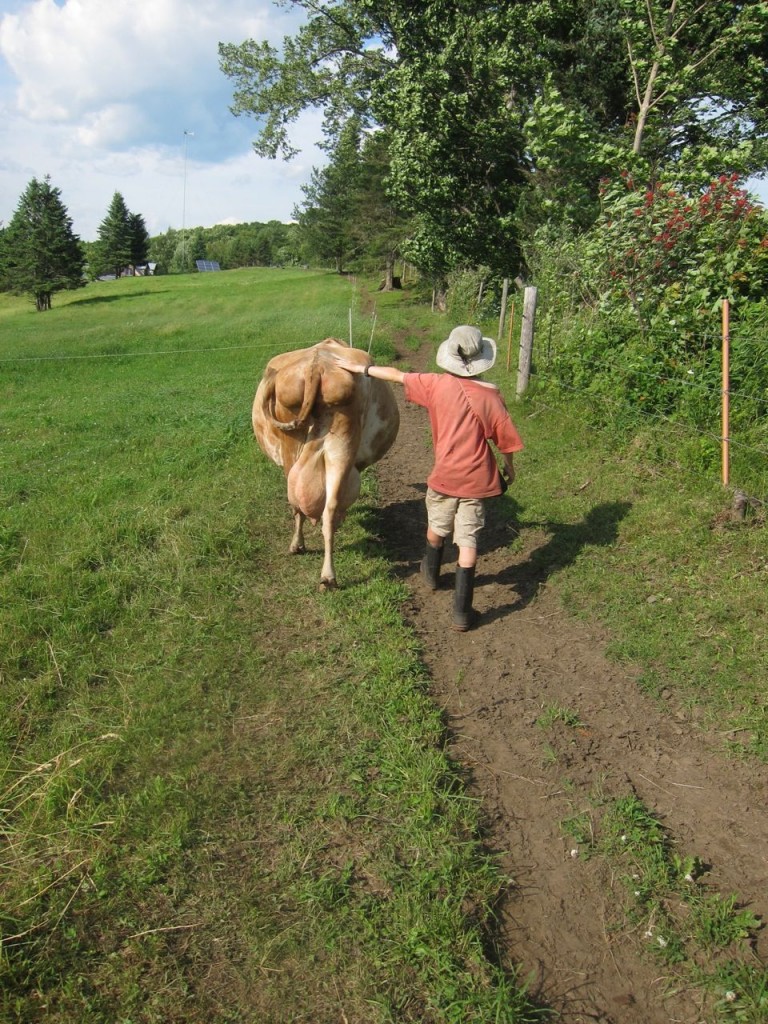
In your new book, you write quite a bit about participating in a “gift economy.” You write: “None of this is discussed; none of it is quid pro quo–I’ll give you this for that–but it has become a substantial and important part of our personal economy, built not on the profit realized from sales, or even on an arranged barter, but on the constant exchange of gifts, the value of which is never overtly expressed in dollars and cents.” This sounds lovely, and we engage in the same sort of economy at our place, since we’re blessed with having extended family nearby. Can you expand on this concept?
Ben: Sometimes I think people think of gift economy in the context of bartering, but in our case, it’s rarely straight-up barter. And it’s not about rejecting money, either, which can be an incredibly useful tool and very much a part of a gift economy. In short, our version of the gift economy is generally less formal that straight barter or straight up monetary payment for services rendered. It sort of evolves out of the elationships we have with friends and neighbors.
For instance, we have a mentor who is teaching the boys blacksmithing, so we pay him a bit and give him some food. Sometimes we give more, sometimes less. Sometimes he stays for three hours, sometimes for five. Because we have a trusting relationship in the first place, so nobody feels like they are going to get taken advantage of.
In general, we believe that supporting ourselves and supporting others in our community are one and the same. There is no separation, and we are fortunate to live in a community where a lot of people feel the same.
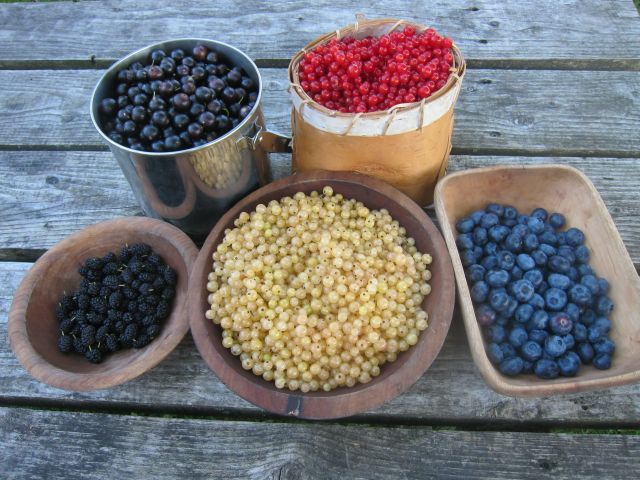
Me: I love this. A lot of family and community networks out here in Nebraska work this way, too. Our extended family certainly does. But many people don’t have that in our society, especially in more urban settings.
Ben: In our modern industrial society, we’ve lost the connections that make it possible to support each other. Your neighbors’ problems are your problems, you know. Unfortunately, most of us don’t live like that any more.
Also, I want to reiteration that money can be part of a gift economy. There’s just a slightly different intent. All of us need money to some extent or the other. We put gas in our car. We buy toilet paper. We pay property taxes. And we use money for all of these things.
But there’s a trajectory there—
Ben: Exactly! The close connection, the inter-dependence has to be first. The thing is . . . it troubles me a little when I hear that folks are trying to become totally “self-sufficient.” I’m not sure it’s possible to be truly self-sufficient. We’re always going to be dependent on somebody. If we move away from being dependent on our neighbors and our community and our family, we’ll transfer that dependence onto corporations and other institutions. Basically, we can feed one another and care for one another, or we can be independent of one another, and we can rely on corporations to feed us and take care of us. Which they’ll be happy to do only so long as we can afford for them to do so.
I believe we need each other. And not only that, I think we need to need one another. It’s written into us.
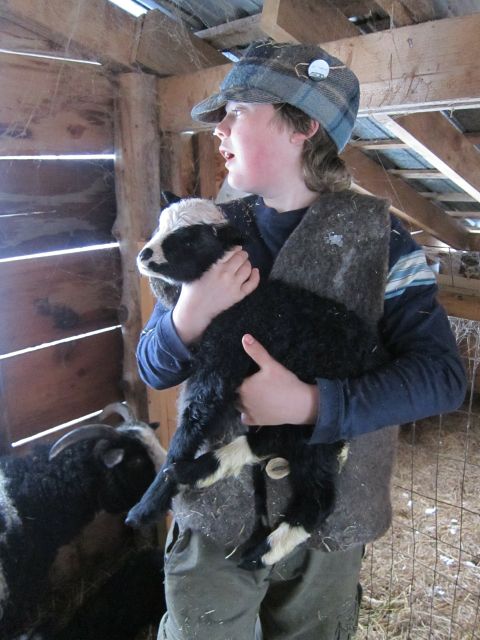
It’s so great to feel needed, especially, I would say, for the older folks in our communities.
Ben: That’s exactly right! I don’t want to enter into hyperbole here, but we have created entire categories of people who are hardly needed any longer in our society: the aged, and in many ways, our children. That’s something that really bothers me.
It sounds as if you have massive gardens and orchards and berry patches and so forth on your land. You’ve worked very hard with your children to put all this wonderful productivity into action, and your place gets more fruitful every year because you’re learning better how to take care of the soil, how to grow crops, etc. In just a few years your two sons will be grown, and probably finding their own way out in the world. Any plans for how you’ll keep your place going without them? And what kinds of changes are you making right now to accommodate that? (This is a selfish question, since we’re facing this in our lives right now).
Ben: The way we are living on this land is evolving–we’re realizing that we need less than we thought we did. We just got rid of one of our freezers (out of five), for example (laughs). So now we just have four chest freezers. In our freezer right now we have beef, pork, chicken, duck, venison, lamb, and five kinds of berries. It’s a little ridiculous! We have 3 greenhouses on this property. We are thinking about the changes that will be coming in the future, with the boys growing up and possibly moving away.
Lately, we’ve been talking a whole lot about how to continue to feed ourselves, but with fewer inputs, with a smaller overall footprint. There are a lot of moving pieces to this, but it’s something we’re working on.
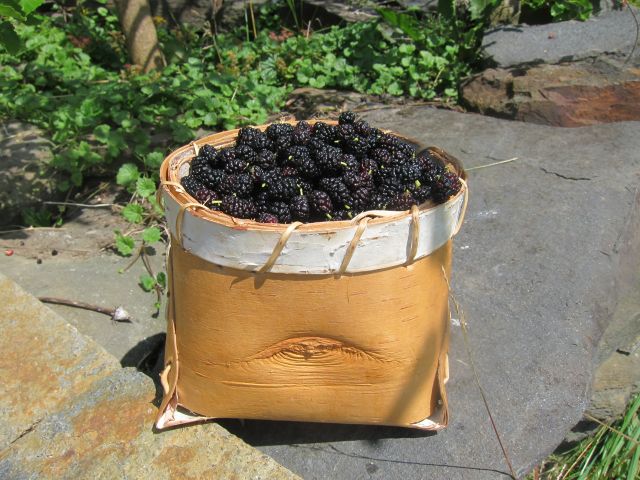
What would be your advice to the folks who want to buy a few acres and start a more independent- from-corporate-food lifestyle? (I won’t use the phrase “self-sufficient” any longer!) If you did it all over again, where would you start? And what things would you not worry about?
Ben: First, if I was looking for a place to buy a piece of land, I’d shop the community before I shopped for land—don’t ever hesitate to knock on doors. Also, if you’re talking about creating infrastructure–if finances aren’t plentiful, that is–remember that you need very, very little infrastructure to do what we do now. People farm all over the world with incredibly simple infrastructure. Heck, we’ve been using discarded pickup truck caps as pig shelters for years; they were free, and they work great.
People sometimes have the mistaken notion that you need a great big beautiful barn to do what we do. You don’t. Our primary hay and livestock barn is a very simple pole barn that we built for $2500.00. So don’t overthink the infrastructure. A majestic barn is nice, of course, but not necessary. Instead, put any resources you have into the soil. Make sure the soil is healthy. Make sure you treat it like the living organism it is, because your health is utterly dependent on its health.
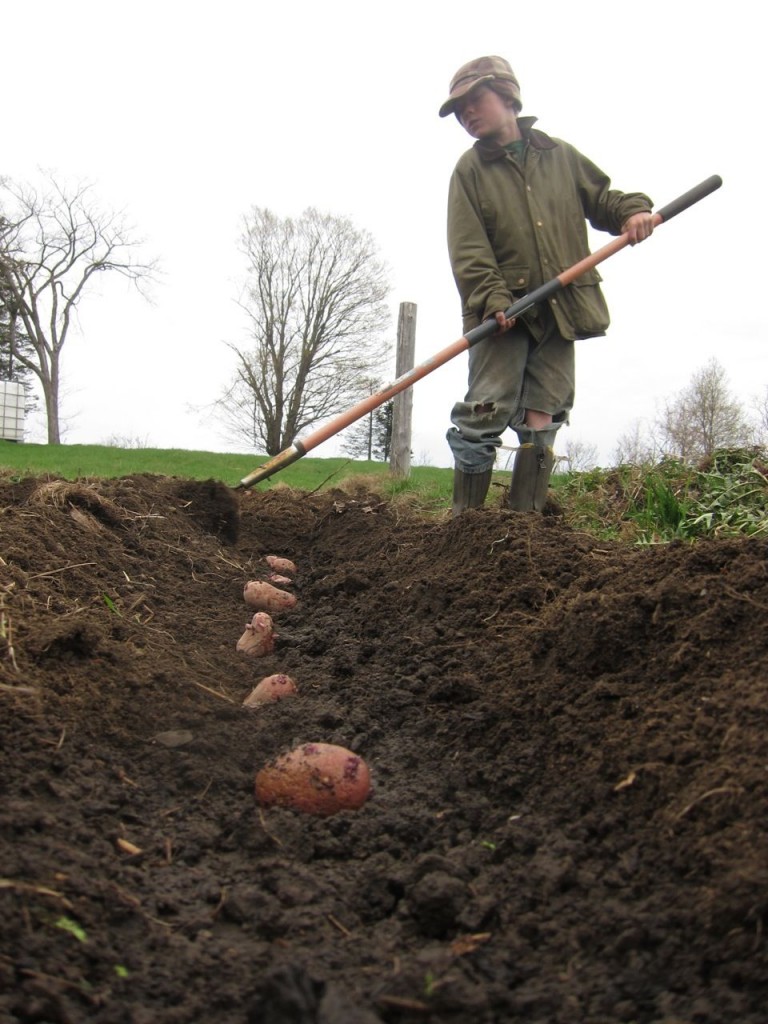
I noticed that you discuss soil analysis and amending very thoroughly in your book. That’s something I’m not very familiar with, but it seems to make a big difference.
Ben: Absolutely, it’s so important. And it’s made a huge difference in the productivity of our gardens.
Me: Switching gears here: you don’t seem to do much social media. I’d like to hear your reasons for that.
Ben: My basic concern with social media is that I don’t want to become captive to it. I love my blog, it’s an amazing outlet for me, but I’m extremely wary – some might say paranoid – of other social media platforms.
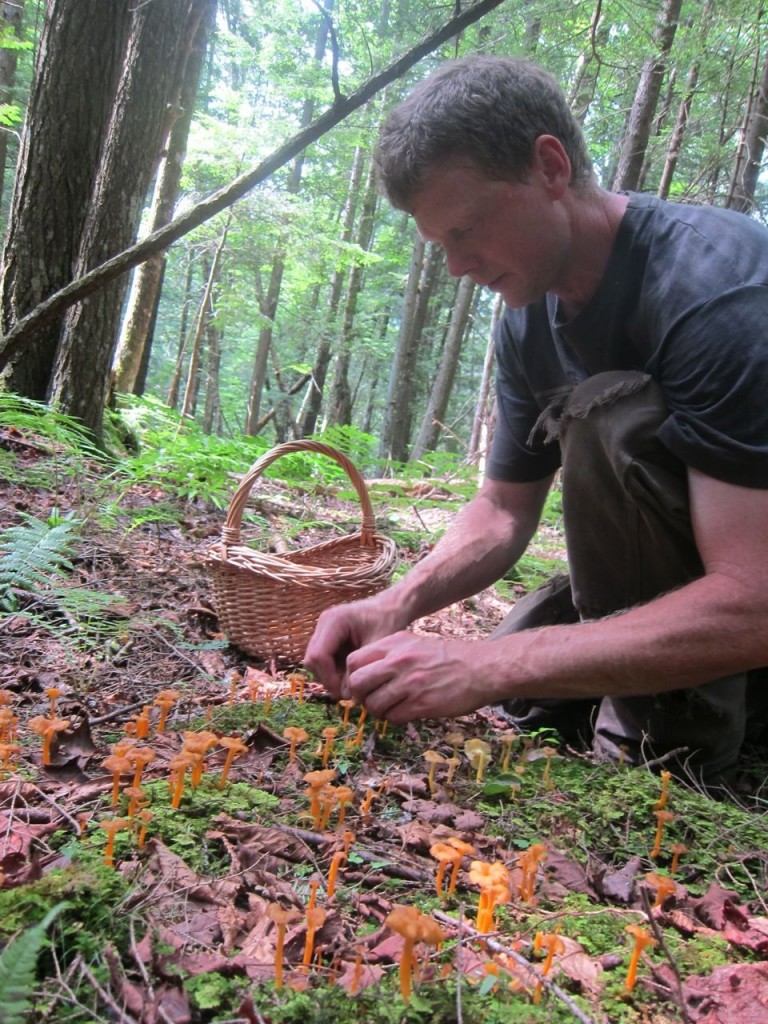
Your readers of your blog are great. They are obviously very engaged with your life, and even seem to have developed relationships with each other! It’s pretty neat.
Ben: I’m really lucky and I feel incredibly grateful for how respectful people are, even when opinions differ.
You write very thoroughly about your livestock, with lots of practical information in your book. Speaking of pigs, I have a friend who lives on a few acres–nice, simple woman 🙂 –she grows most of her own garden veg, but she wants to raise a few pigs, and her husband is not onboard with the idea. At. All. Any advice for this wretched pig-desiring woman?
Ben: The first things I would say is: maybe he doesn’t have to be onboard. 🙂 Pigs require perhaps the least amount of intervention of all the common homestead creatures you can raise. Just be sure to have good strong fencing, from the start. We always train our pigs to single-strand electric fence, which makes for super-simple rotating. But you must, must, must train them to electric inside a physical barrier first!
The only downside to pigs is that they eat a lot; I mean, they’re called “pigs” for a reason, right? We’re really fortunate to have access to large quantities of organic waste milk and colostrum, which really cuts down on our feed bill. And of course, pigs are the perfect companion to milking animals. We make a lot of butter from our cows, and feed the skimmed milk to the hogs.
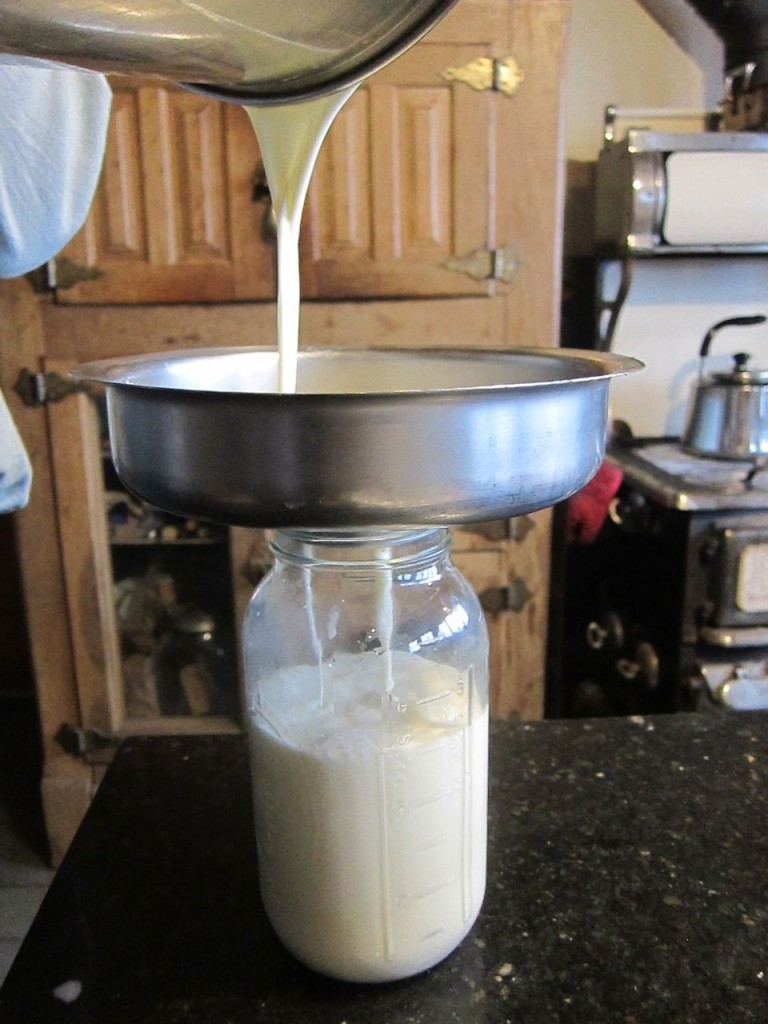
I love the recipes that you’ve included in your book: dried “mango” chips made out of melon, homemade mayo made from raw eggs and coconut oil, cream kefir made from raw cream, and of course kimchi. Any chance you and Penny might be considering doing a recipe book?
Ben: We are totally not foodies, despite all the time we spend in the process of producing food. Discussing recipes and talking specifically about food is not really something we do a lot of. We don’t follow recipes much, per se. Much of what we do is just throw things together—we’re big fans of one-pot lunches.
Do you have any favorite breeds of laying hens?
Ben: We’re always switching it up–we have really liked Golden Comet chickens a lot, after trying lots of breeds. I’m always a tiny bit vexed by our layers… they’re either laying where we don’t want them to, not laying when we want them to, or laying way more eggs than we can eat. But I’m not so vexed I’m ready to give them up!
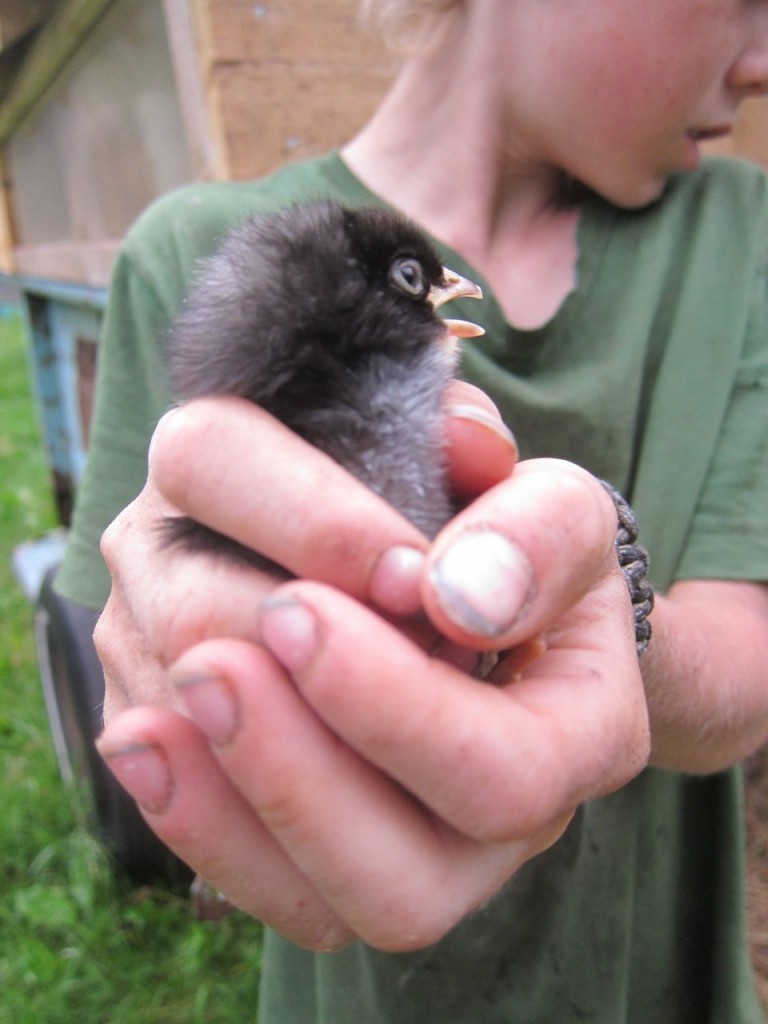
Hey, I wrote a blog post about that–you might want to check it out. 😉
Ben: In my experience with a variety of livestock, you get less bang for your buck with the chickens. Pigs are much, much easier to raise–and they provide much more return on your investment. A beef cow is really easy to raise, too and besides, it’s a cow and as far as I’m concerned, there’s no greater pleasure than communing with cows.
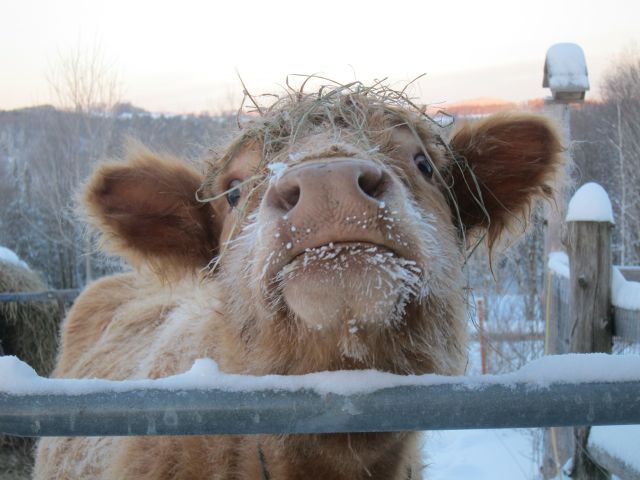
Thanks, Ben. Stay warm out there.
Ben: You too, Amy!
I’ve been carrying around my copy of The Nourishing Homestead, it’s already well-marked and it’s my new favorite homesteading book. I recommend that you add it to your own library! It’s a beautiful book, and is full of Penny’s gorgeous photos like the ones in this post. You can pick one up at your local bookstore, or if you’re snowed in today (like I am) you could order one of course, by clicking The Nourishing Homestead: One Back-to-the-Land Family’s Plan for Cultivating Soil, Skills, and Spirit or you could order a copy from Ben and ask him to sign it, which–of course–would be even better. 🙂
Oh! One last thing: don’t forget to enter this giveaway of a copy of The Nourishing Homestead, from Chelsea Green Publishing:
(A bit of business: because of rising shipping costs, this giveaway is only for residents of the U.S.)
- The garlic secret that you must know before you eat another bite!
- 10 Tips for eating like a Hobbit: and “Recipes from a Halfling’s Pantry”


What homesteading skill would you most like to learn? Oh dear dear dear. I’m a failed homesteader. I could write a book of everything I did wrong, which was a LOT! Reading this post made me wistful. But for me, it was not to be. (still, I wouldn’t mind reading the book, and I’ve entered the giveaway.
Good luck to you, then, my friend, on winning the book!
A great article, looking forward to going thru more of Bens website. Thanks for the give away
Hi Amy,
Great post! Awesome pictures and fantastic review of Ben Hewitt and his homestead……I am not a farmer so all this is new to me 🙂 Very interesting!
Oh my – what beauty – and love is shared here – peace and joy – well and lots of work and discipline – great life for all it would seem – very nice and congrats on the interview!
My homesteading skill? Soapmaking, and sewing and so much more!
I would like to build a simple greenhouse/hoop house and learn how to extend my season.
There is tons of interesting information here. Ben’s so right about the elderly not being needed. My father visited China when it opened up to tourists again in the 80s (if I remember rightly). He said the old people had tons of jobs from looking after the children to sweeping streets. They should be part of the community, in whatever capacity they have.
I so agree, Francene!
What homesteading skill would you most like to learn? I’d like to learn more about gardening, so as to expand our small gardens and produce more for longer during the year. We have such good growing seasons, and I’d like to be able to take advantage of them. I’d also like to learn to sew again.
That’s a great one, Jules. And you’ll never stop learning about growing things.
Wow! Brings back memories of helping my dad stake out & scrape down cow hides for Natives American parfleches, boxes, etc. My parents also ran a biodynamic, organic farm….
Nice interview…thanks! Homesteading skills….all of them! Ah, dreams are a wonderful thing! Warm wishes to all!
All of them! Now that’s a tall order, Ari!
Next on my list of skills to acquire is fermenting and salting food for preservation. Hoping to grow enough beans this year for salting them down in a crock to be worthwhile. Thanks!
Julia, I’m just learning how to make ferments and my goodness–it is so easy! And fun!
I think I would like to learn how to raise chickens for meat.
What homesteading skill would I most like to learn…is a hard question to answer! I’ve yet to live in a place where I could keep animals, and really would like to have chickens, a cow and sheep, so learning to care for them would be high on my list, but honestly, homestead/time management is the thing I NEED to learn! I Unschool 5 of my 6 kids and struggle with the basics, like making sure they all eat adequately during the day and getting dinner on the table before bedtime! I imagine getting a handle on using my time to best effect should happen BEFORE I have more critters relying on me to keep them fed! So glad Ben posted this link, as I’d never seen your blog before and have happily added it to my list of favorites! I can’t wait to get to know you!
Yola,
It certainly is good to meet you! I can totally empathize with the crush of duties and responsibilities and the very real problem of just what to do next . . . Having a big family (I know, we have 6 kids, also!) is so time consuming, but you know (you know!) if you are raising the children to contribute and to learn how to do things, they will be able to help on your homesteading journey. Four of our six have grown up and moved on to their own lives, and we like to say that we raise them up to be a real blessing and help to us (the goal is that each of the kids can do everything I can do–clean house, bake bread, help butcher chickens, cook meals, plant trees, etc.) before they leave. But then (mercy!) you MISS them like crazy, not only just for being them, but also for all that they helped you with! So my advice today: teach the children well, and then just do the next thing. Teach the littles to help get the meals on the table, and then turn over some of them to them. *hugs* to you. It’s a big job, but you can do it!
I’d love to learn more about keeping a cow. Raw milk is illegal where I live, and I would love to have access to my own supply for home use. Thanks for the opportunity to win this great book.
Illegal raw milk. Pshaw. There oughta be a law against making healthy food against the law, Sandra!
The homesteading skill I would most like to learn is how to grow a really vibrant veg garden! I seriously can’t even keep windowsill plants alive and I have no idea why, which is disappointing because I want nothing more than to grow some of my own produce. I did just plant a piece of ginger that’s coming up nicely though, so maybe there’s hope 🙂
Kat,
Ginger is actually really difficult to grow, so if you can grow ginger, you’re doing pretty well! My advice? Start small, and start with something you like to eat–radishes? lettuce? Squash? Just start small and learn as you go! You can do it!
I’d like to learn to make cheese. And I’m really excited to perhaps win a copy of this wonderful book that Ben wrote.
You would LOVE it, Rita! I’ve made cheese exactly once, but I’d like to learn to make it again.
I’d really like to learn shepherding. Someday I want to have a couple sheep for wool & milk and an alpaca for its lovely fibers.
Ohhh, Liz, me too. Me too! And a few angora bunnies, as well . . . 🙂
I would like to learn to become energy efficient…like solar or wind power…whatever would get me off the grid. 🙂 Thank you.
Oh, where to begin? Right now, I live in the middle of a city with just a small balcony to do “homesteading” on, so I guess the skill that would be most relevant right now is container gardening, but in my heart of hearts, I’d love to keep animals, especially sheep and goats.
Thank you and Ben for the interview, and to Chelsea Green for the giveaway!
Which homesteading skill? Well, I still can’t grow carrots very well after almost a dozen years of trying, lol. We all ready have our acreage, built our home and barn, grow a large majority of our food, raise chickens, hunt for meat, can/freeze/smoke/dehydrate to preserve what we harvest, sew, quilt, knit, heat w/wood. . . I guess I’d like to conquer cheesemaking–preferrably from milk from my own cow or goats; don’t have those yet 😉 I’d also like to raise a steer, a hog, and some lambs for meat and butcher those (since we mastered butchering deer, why not go big?)
I love Ben’s blog, been following it for years, have been waiting anxiously for his Nourishing Homestead book to come out. Would love to win a copy of my own. Thank you for hosting this giveaway.
Want to learn about milk cows and cheese making!
I’m right there with you, Amanda!
I’d love to learn how to grow vegetables without pesticides, especially the mulch garden way.
Hmmm…I think I would LOVE basket making as a homesteading chore…or even haying for my livestock. I already grow fodder for them to eat but haying would also help with feed costs.
Making butter would also be pretty cool – but my goats dont produce much cream 🙁 Downside of owning goats!
Jamie,
I think basketmaking would really be fun to learn, too! Now and then Ben actually has workshops to teach this.
I’d love to learn better bee keeping skills and the art of making hard cheese…well. 🙂
Truly amazing article that made me think of so many things! I would love to read this book! Living in a homestead is just a dream come true 🙂
I love Ben and Penny’s book, too, Lillian. It gives me SO MANY IDEAS of new projects and new recipes and new pigs . . . !